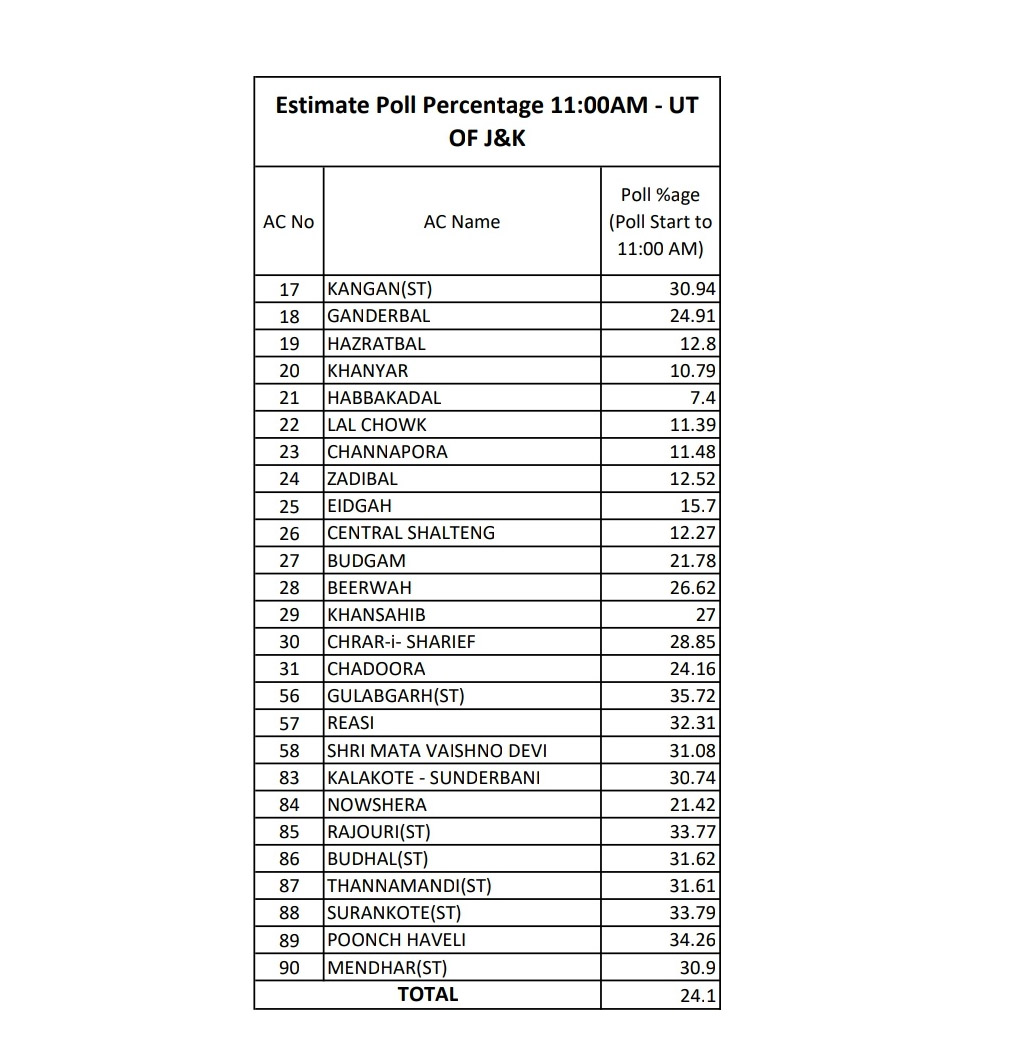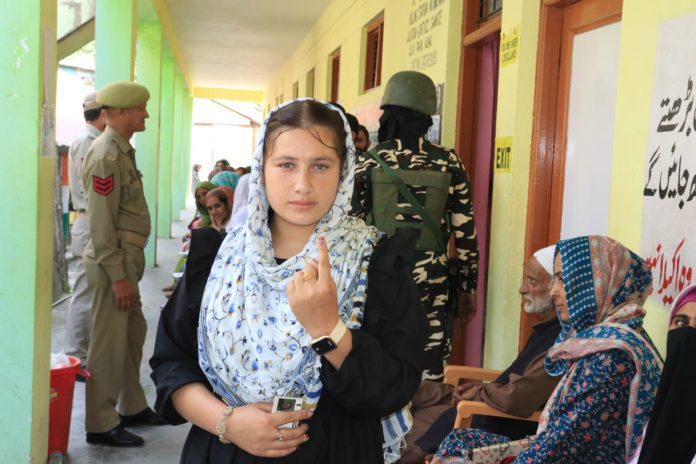SRINAGAR, Sept 25: Electorate in Jammu and Kashmir came out in numbers on Wednesday as 26 seats in six districts voted in the second phase of elections, with a delegation of foreign diplomats watching the union territory’s first assembly polls since the abrogation of Article 370 in 2019.
Voting began at 7 am and proceeded peacefully amid tight security. Officials data showed polling picked up pace quickly with nearly one-fourth of the eligible electorate exercising their franchise in the first four hours.
According to the Election Commission numbers, an overall voter turnout of 24.1 per cent was recorded till 11 am in J-K, with Gulabgarh (ST) seat in the Jammu region recording the highest voting percentage of 35.72.
Among the 15 assembly segments of the Kashmir valley, the maximum voting percentage was recorded in Kangan (ST) at 30.94, followed by Chrar-i-Sharief (28.85) and Khansahib (27).
At many places, long queues of enthusiastic voters were witnessed, with the people eager to cast their ballot.
Voters — men, women, elderly and youth — proudly displayed their inked finger after exercising their franchise as the polls are held without a shadow of boycott or militant threat.
The atmosphere at the polling stations was vibrant and the excitement was writ large as first-time voters, centenarians, and specially-abled people expressed their passion for democracy.
The assembly constituencies where polls are being held in the second phase are spread over six districts — three each in the Valley and the Jammu division.
The Ministry of External Affairs has invited 16 foreign delegates from New Delhi-based missions to observe the ongoing polls. The delegation visited polling stations in Budgam and Srinagar soon after their arrival in the Valley, and was briefed by the respective deputy Commissioners on the voting process.
However, the National Conference (NC), the regional force in J-K, criticised the visit of the foreign delegation, and lashed out at the Centre. NC vice president Omar Abdullah said the polls were an internal matter of India.
“I don’t know why foreigners should be asked to check elections here. When foreign governments comment, then the government of India says ‘this is an internal matter for India’ and now suddenly they want foreign observers to come and look at our elections,” Abdullah told reporters here.
He said the assembly elections in J-K “are an internal matter for us”, and “we do not need their certificate”.
The NC leader said if India does not want the interference or comments of the foreign nations over J-K, “then why are they invited here?” He questioned the government on denying permission to foreign journalists to cover the polls.
“If foreign diplomats can be invited here, why are then the foreign journalists not permitted. No permission was given to any foreign journalist who had applied to cover the elections. But, these diplomats are being given a guided tour like tourists which is not a good thing,” he said.
The second phase of polling will decide the fate of 239 candidates including Omar Abdullah, a former chief minister of the erstwhile state of J-K who is contesting from two seats — Budgam and Ganderbal.
Apart from Abdullah, other key candidates whose fate will be determined in this phase include JKPCC president Tariq Hamid Karra and BJP J-K chief Ravinder Raina.
Karra is contesting from Central Shalteng, while Raina will be trying to retain his Nowshera seat in Rajouri district, which he won in the 2014 assembly polls.
For this phase, 93 candidates are in the fray in Srinagar district, followed by 46 in Budgam district, 34 in Rajouri district, 25 in Poonch district, 21 in Ganderbal district and 20 in Reasi district.
The constituencies going to polls in Srinagar district are: Hazratbal, Khanyar, Habbakadal, Lal Chowk, Channapora, Zadibal, Central Shalteng and Eidgah.
The segments in Budgam district are: Budgam, Beerwah, Khansahib, Chrar-I-Sharief and Chadoora, while there are two constituencies in Ganderbal district — Kangan (ST) and Ganderbal.
The seats going to polls in Jammu division are Gulabgarh (ST), Reasi, Shri Mata Vaishno Devi (in Reasi district), Kalakote-Sunderbani, Nowshera, Rajouri (ST) (in Rajouri district), Budhal (ST), Thannamandi (ST), Surankote (ST), Poonch Haveli and Mendhar (ST) (Poonch district).
The Election Commission of India has set up 3,502 polling stations in these segments. There are 1,056 urban polling stations and 2,446 rural polling stations.
A multi-tier security blanket has been thrown around each polling station to ensure the voting for the second phase is held in an atmosphere free of fear, the officials added.
Security personnel drawn from the local police, armed police and central armed paramilitary forces have been deployed in strength around the polling stations.
The voting is scheduled to end at 6 pm. (Agencies)



